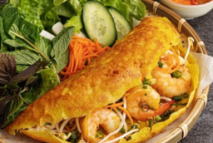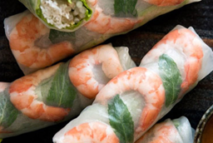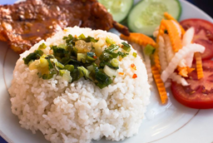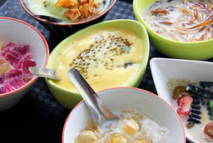Latest Stories
Kimchi (김치) is a traditional South Korean fermented vegetable dish, most commonly made with napa cabbage or radish and seasoned with a variety of spices and aromatics. It is a staple side dish (banchan) in Korean cuisine and is enjoyed for its spicy, tangy, and umami-rich flavor. Key Ingredients: Vegetables: Napa cabbage (Baechu) or Korean...
Learn moreKimbap (김밥), often referred to as Korean sushi, is a popular and versatile Korean dish made by rolling rice and various fillings in seaweed (gim). It is commonly served as a snack, picnic food, or lunch box item and is a staple in Korean cuisine due to its portability and delicious combination of flavors. Key...
Learn moreJapchae (잡채) is a traditional South Korean dish made from stir-fried glass noodles (also known as sweet potato starch noodles) mixed with vegetables, meat, and a flavorful soy-based sauce. It’s a popular dish served at special occasions like birthdays, weddings, and holidays, and is also commonly enjoyed as a side dish or main course. Key...
Learn moreHaemul Pajeon (해물파전) is a Korean savory pancake made with seafood (haemul) and green onions (pajeon). It’s a popular appetizer or side dish in Korean cuisine and is often enjoyed with makgeolli (a traditional Korean rice wine). The dish is crispy on the outside, while remaining soft and chewy on the inside. It is commonly...
Learn moreBulgogi (불고기) is one of the most iconic and beloved Korean dishes, known for its marinated, grilled beef that is tender, flavorful, and slightly sweet. The name “bulgogi” literally translates to “fire meat” (from “bul” meaning fire and “gogi” meaning meat), referencing the traditional method of grilling the meat over an open flame. It’s typically...
Learn moreBibimbap (비빔밥) is a classic South Korean dish that translates to “mixed rice.” It’s made by topping a bowl of steamed rice with a variety of vegetables, meat (usually beef), a fried egg, and gochujang (Korean chili paste), all mixed together before eating. The dish is known for its colorful presentation and a balance of...
Learn moreBánh Xèo is a popular Vietnamese savory pancake that is crispy, golden, and stuffed with a variety of flavorful ingredients. The name “Bánh Xèo” translates to “sizzling cake” in Vietnamese, referring to the sizzling sound the batter makes when it hits the hot pan. Key Ingredients: Batter: Made from rice flour, turmeric powder, and coconut...
Learn moreGỏi Cuốn (Vietnamese Spring Rolls) are fresh, light, and healthy Vietnamese appetizers made with rice paper (bánh tráng) that encase a variety of fresh ingredients. They are often referred to as “summer rolls” or “fresh spring rolls.” Key Ingredients: Rice Paper (Bánh Tráng): Thin, translucent sheets used to wrap the rolls. Shrimp: Cooked and peeled...
Learn moreCơm Tấm (Vietnamese Broken Rice) is a traditional Vietnamese dish made from broken rice grains served with a variety of toppings. It is especially popular in southern Vietnam, particularly Ho Chi Minh City (Saigon). Key Components: Broken Rice (Cơm Tấm): Broken grains of rice that have a softer and slightly chewy texture compared to whole...
Learn moreChè is a broad category of Vietnamese sweet desserts that can be served as a drink, pudding, or soup. It is highly versatile and comes in hot or cold variations, making it a popular treat year-round. Types of Chè: Chè Thái: A colorful dessert with fruits, jellies, and coconut milk. Chè Ba Màu (Three-Color Dessert):...
Learn more










Login with